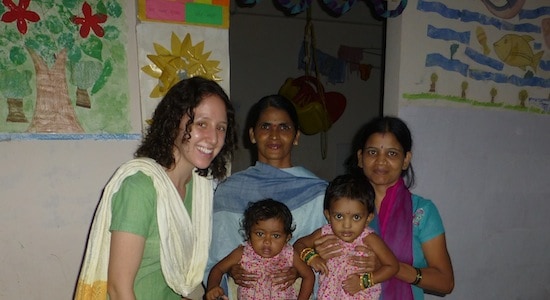Grassroots Activism: Migration and Education on Mumbai’s Construction Sites


Before arriving in Mumbai, I didn’t have the slightest sense of what this work actually looked like. The nature of the construction industry is completely different in Mumbai than anywhere else I have ever been. In Mumbai, construction workers and their families live on the construction sites. The housing colonies for the workers are generally shanties, where they have limited or no access to proper hygiene and sanitation facilities, government benefits, or childcare services. Most construction workers make the equivalent of around $2-3 a day, an amount that is still unfathomable to me when I think about how those few dollars often have to sustain an entire family. Malnourishment is one of the scariest and most prevalent issues on construction sites, and for many reasons most kids are marginalized from formal schooling options.
MMC sets ups centers directly on construction sites, and to reach the centers you often have to walk over a kilometer (yes, I’m an American who’s come to appreciate the metric system) through the dusty and dangerous construction site. When you get to the centre, oftentimes just a simple four-room structure with tin walls and roofs, there’s really only one way to describe the atmosphere: bustling. Just like at any school, there’s never a dull moment. The babies in the creche are doing what babies do best- playing with toys and with each other, spitting on things, giggling, and peeing. The best is when the teachers strap little ankle-bells to the babies’ feet and start a musical parade around the classroom.
In the pre-primary and primary classrooms, I’m always impressed by how much ownership the kids take over their work and taking care of their centre. I’m fairly certain that when I was seven years old I wasn’t clearing and rinsing my plate after lunch, nor was I helping kids younger than me to wash their hands or eat their snacks. Whenever I walk into a room the kids will all say “namaste” in unison to welcome me. Many of them call me teacher or didi (“older sister” in Hindi) and it melts my heart every time. The kids are eager to show off their reading, writing, painting, singing, and dancing skills, and even when I can’t understand the language it’s always clear how proud the kids are to share what they’ve learned. I once sat down to play a game of memory with a five-year-old and he kicked my butt. I wasn’t even pulling the “let the little kid win” move, which was slightly embarrassing.
If multi-tasking was an Olympic sport–which maybe it should be, if weird things like tug-of-war made the cut in the early 1900s–then the MMC teachers would destroy their competition. They teach, cook, feed, clean, do community outreach work–you name it, they’re doing it. Most of the classroom teaching aids are made in-house out of what most people would consider garbage. I’ve sat and watched as a teacher took an old plastic water bottle, a few scraps of fabric, paint, and some yarn and turned it into a beautiful puppet. I’m amazed by how they brighten what would otherwise be a dingy and even dismal space with beautiful murals and children’s artwork. Many of the teachers are women who themselves live on construction sites and they are some of the kindest women I’ve ever met. Oftentimes I’ll stay at a centre for lunch, where they immediately offer me huge chunks of their delicious home-made food and pretend to like the boring stuff that I bring in my tupperware. It’s pretty amazing how, in spite of my very limited Hindi and their very limited English, we can manage to communicate and have a great time together.
During one visit, I was playing with some of the babies while a coworker was talking with one of the baby’s mothers, trying to fill out some paperwork. The mother said she didn’t know her birthday, but that she was 23 years old. My colleague politely told her that was impossible as the woman has a 10-year-old daughter. Turns out, the woman had been married before she reached puberty and had a child within a year and a half of her marriage, so she had her first child at age 13 and was now 23. It’s a reality that still shocks me and that I know I will never be able to fully understand. Little things are amazing to see, like sitting in during art class and having a girl show me a perfect, miniature kitchen set made out of clay, including a tiny chapati board and roller and an eggplant the size of my fingernail. Another day I got to sit in on a math class in the primary classroom, and even without understanding most of what the teacher was saying I could tell that she was outstanding. The kids were completely engaged in the lesson and she never stopped smiling and encouraging them. I got overexcited when she started going over Hindi numbers because I was thinking, “Yes, I can do this too! Ek, do, teen, char, panch…”
Being on a construction site can be overwhelming, but mostly I just see happy, silly, smart, rambunctious kids. As someone interested in pursuing a career related to international development and education, I’m left with lots of questions about my own role and relevance at this organization and in this field, which is exactly how it should be. I’m always amazed by the work that MMC does and really happy to be a small part of it, if only for a short time.








